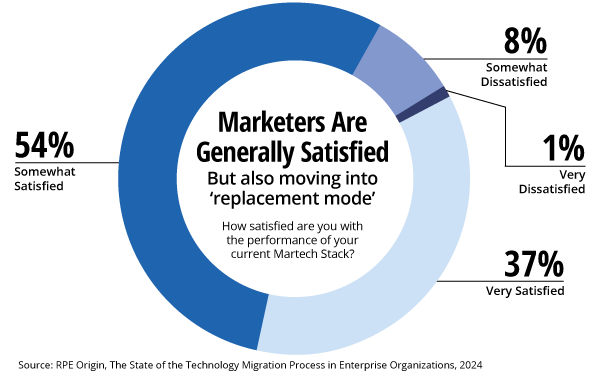
Marketers are mostly satisfied with
their tech stacks -- and they have faith in their ability to replace or update them, should the need arise.
But few have been involved in multiple tech-stack migrations. And many review
their systems only when they need to and not on a regular basis, judging by The State of the Migration Process in Enterprise Organizations 2024, a study from RPE Origin conducted in partnership
with Ascend2 and the Global Email Alliance.
On the positive side, marketers seem happy with their tech stacks, saying they are:
- Very
satisfied — 37%
- Somewhat satisfied — 54%
- Somewhat dissatisfied — 8%
- Very dissatisfied —
1%
advertisement
advertisement
And, 40% are very confident in their ability to manage their migrations, and 52% are somewhat so. The remainder lack confidence to some degree.
But that
high tech stack satisfaction level could mask impatience with lagging technology, the company posits.
First, a definition: The study uses the phrase "martech stack" as “shorthand to
include the combination of email software or email service provider (ESP), customer relationship management (CRM) platforms, customer data platforms (CDPs), and other marketing automation
tools.”
Companies changing their tech stacks face serious hurdles:
- Budget Constraints — 50%
- Integration Complexities — 41%
- Delays in Implementation — 39%
- Data Migration Issues —
38%
- Team Resistance to Change — 30%
- Downtime During Migration — 26%
- Lack of Expertise — 25%
Despite those issues, companies seek change for the following reasons:
- Improving efficiency and productivity —
67%
- Cost savings — 52%
- Staying competitive in the market — 48%
- Aligning with organizational goals — 46%
- Addressing specific pain points — 33%
- Lack of
platform innovation — 18%
Companies assess their marketing technology for potential updates on this schedule:
- Quarterly
— 25%
- Bi-annually — 21%
- Annually — 19%
- As needed — 30%
- Never — 5%
The study urges marketers to check in every six months to update statistics and return on investment.
“Don't wait for a crisis,
like a breakdown in the middle of your heaviest email season, to question your technology,” the study warns. “The 30% of marketers who audit their martech stacks ‘as needed’
might run into this problem.”
Then there is experience. Of those polled, 18% have been through more than six migrations. Another 20% have experienced four to six, and 48% from one
to three. Only 14% have never worked on one.
Who’s in charge? These are the teams primarily responsible:
- Marketing Department —
26%
- Cross-functional/Cross. Department team — 22%
- IT Department — 22%
- Executive
leadership/Management — 21%
- Vendor or Solution Specialists — 6%
- Other —
3%
Meanwhile, here is what they expect from vendors:
- Moderate training & support —
55%
- Extensive Training & Support — 34%
- Basic Training & Support — 10%
- None — 1%
But adequate help is essential.
"Moving to a new technology platform, such as an email service provider, is a major event," says Ryan
Phelan, CEO of RPE Origin. "If you rush the process or go it alone without preparation or help from an experienced transition manager, you will disrupt your day-to-day business across the
organization."
Ascend2 surveyed 155 Enterprise companies with more than 500 employees in February.